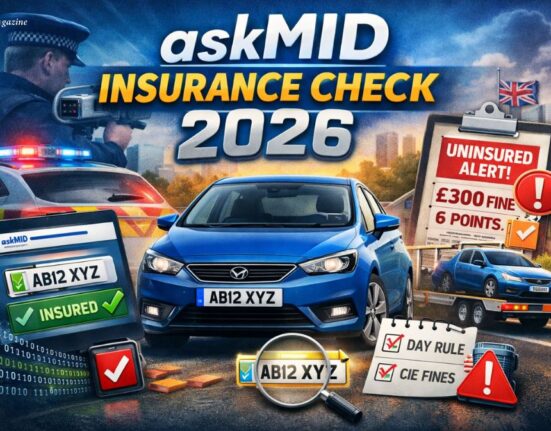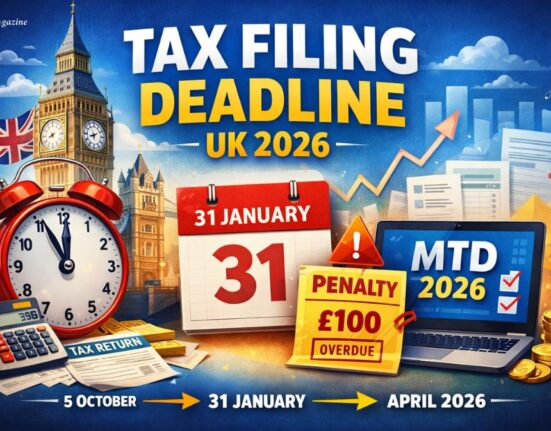If your payslip looks a little off and your take-home pay feels smaller than it should, there’s a chance you’re on the wrong tax code. Every year, millions of UK workers end up overpaying or underpaying income tax because of coding errors. In fact, HMRC regularly reviews tax codes and makes adjustments — but mistakes happen, and if yours is wrong, you could be missing out on money that’s rightfully yours.
This guide breaks down what tax codes are, how to spot mistakes, and what to do if you find yourself in the wrong code.
What Is a Tax Code (and Why It Matters)?
A tax code is a series of numbers and letters used by HMRC (HM Revenue & Customs) to calculate how much income tax should be deducted from your wages or pension. Most UK taxpayers have a code that reflects their personal allowance (the amount they can earn before paying tax).
For example:
- 1257L is the most common tax code, giving most people a £12,570 tax-free allowance.
- BR means you’re paying 20% tax on all earnings with no allowance applied.
- OT is often used as an emergency tax code, meaning all income is taxed with no personal allowance until HMRC receives the correct details.
If your code is wrong, it directly affects your take-home pay. A higher deduction could mean you’re owed a tax refund, while a lower one could lead to an unexpected tax bill later in the year.
Signs Your Tax Code Might Be Wrong
It’s surprisingly common to be placed on the wrong code. Here are some scenarios where mistakes often happen:
- Starting a new job – especially if payroll doesn’t process your P45 correctly.
- Multiple jobs – your employer may apply your allowance to only one job instead of splitting it.
- Receiving a pension and salary – HMRC taxes pension income differently, which can confuse coding.
- Benefits in kind – such as a company car or medical insurance, which employers must include in your code.
- Outdated personal details – if you don’t update HMRC about changes in your circumstances.
If your payslip looks unusual or your tax deductions seem too high or low, your tax code may be wrong.
What Happens if You’re on the Wrong Tax Code?
A wrong code doesn’t just affect your payslip — it impacts your whole financial year.
- If you overpay tax, you might be due a refund from HMRC. This is often corrected automatically, but only if the error is spotted.
- If you underpay tax, HMRC will eventually send a tax bill to recover the shortfall. This can be stressful if you weren’t expecting it.
- Budgeting issues, even a small coding mistake, can knock your monthly budget out of balance.
It’s estimated that millions of UK workers may be owed refunds due to being on the wrong tax code. That’s why it’s worth checking regularly.
How to Check if Your Tax Code Is Correct
Fortunately, it’s easy to check your code. Here’s how:
- Look at your payslip – your code is usually printed next to your National Insurance number.
- Check your P45 or P60 – these official documents also list your tax code.
- Review HMRC’s coding notice – a letter or online update showing how your code was calculated.
- Log in to your Personal Tax Account – through the Government Gateway or HMRC app to see your current code and breakdown.
- Use the gov.uk tax code checker – a free tool to compare your income and allowance.
A standard worker with one job and no additional benefits should usually have the 1257L code. If yours is different, it’s worth investigating.
What to Do if Your Tax Code Is Wrong
If you think something is off, here are the steps to fix it:
1. Confirm with Your Employer or Pension Provider
Sometimes, the issue is with payroll rather than HMRC. Check that your employer has the right details from your P45 or P60.
2. Contact HMRC Directly
If payroll checks out, go straight to HMRC. You can:
- Call the HMRC helpline (numbers available on gov.uk).
- Use the online tax code service via your Personal Tax Account.
- Write to HMRC if necessary (keeping copies of correspondence).
3. Update Your Employment Details
If you’ve started a new job, added a pension, or now have multiple jobs, HMRC needs to know. Incorrect or outdated information is one of the biggest causes of wrong codes.
4. Request a Corrected Coding Notice
Once HMRC updates your details, they’ll issue a new tax code and notify your employer. This usually updates in the next payroll cycle.
5. Keep Records
Always keep payslips, P45s, P60s, and any coding notices. These are useful if HMRC asks for proof.
How to Claim a Tax Refund if You’ve Overpaid
If you’ve been on the wrong tax code and overpaid tax, you might be due a refund. Here’s how to claim:
- Automatic refund – HMRC often issues refunds automatically through your payroll.
- Claim online – via your Personal Tax Account on gov.uk.
- By post – you may receive a P800 tax calculation letter, which outlines if you’re owed money.
Refunds usually arrive as a bank transfer or cheque. If you prefer, they can also adjust your next tax code to balance things out.
Be cautious of unregulated tax refund companies. Many take large fees for services you can access for free via HMRC. Always deal directly with HMRC or a trusted accountant.
Preventing Wrong Tax Codes in the Future
While mistakes can’t always be avoided, you can reduce the risk:
- Keep HMRC updated on any job changes, benefits, or pensions.
- Double-check payslips each month for unusual deductions.
- Log in to your Personal Tax Account at least once a year.
- Ask an accountant or tax advisor if your situation is complex (e.g., multiple incomes, self-employment plus PAYE).
- Remember to check your tax code at the start of each new tax year in April.
FAQs
Q: Is my tax code wrong? How can I tell?
If your take-home pay doesn’t match your expected allowance or you see codes like BR or OT unexpectedly, your tax code may be wrong.
Q: What do I do if HMRC gives me the wrong tax code?
Contact HMRC directly through your Personal Tax Account or by phone. Provide details of your income, benefits, and employment.
Q: How do I change my wrong tax code with HMRC?
You can’t change it yourself. HMRC updates it after reviewing your details. Your employer will then apply the new code.
Q: Can I get a refund if I was on the wrong tax code?
Yes. If you’ve overpaid, HMRC issues refunds automatically or after you claim online.
Q: What happens if I don’t fix my tax code?
You may overpay or underpay tax. If underpaid, HMRC will eventually send a tax bill.
Final Thoughts
Being on the wrong tax code is more common than most people think, but it’s not something to panic about. With millions of UK workers affected each year, it’s worth taking five minutes to check your code.
If you discover yours is wrong, the fix is straightforward: confirm details with your employer, update HMRC, and keep an eye on your payslips. You might even discover HMRC owes you a tax refund — a welcome bonus that puts money back in your pocket. When it comes to taxes, knowledge really does pay.
Visit: Pure Magazine








